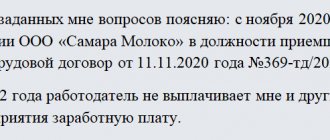New edition of Art. 56 Code of Criminal Procedure of the Russian Federation
1. A witness is a person who may be aware of any circumstances relevant to the investigation and resolution of a criminal case, and who is called to testify, except for the cases provided for in part three of this article.
2. Summoning and questioning of witnesses is carried out in the manner established by Articles 187 - 191 of this Code.
3. The following are not subject to questioning as witnesses:
1) judge, juror - about the circumstances of the criminal case that became known to them in connection with participation in the proceedings in this criminal case;
2) lawyer, defender of the suspect, accused - about the circumstances that became known to him in connection with the application to him for legal assistance or in connection with its provision, except for cases where the lawyer, defender of the suspect, accused applies for questioning as a witness with the consent of and in the interests of the suspect, accused;
3) lawyer - about the circumstances that became known to him in connection with the provision of legal assistance, except for cases where the lawyer applies for questioning as a witness with the consent of the person to whom he provided legal assistance;
4) the clergyman - about the circumstances that became known to him from confession;
5) a member of the Federation Council, a deputy of the State Duma without their consent - about the circumstances that became known to them in connection with the exercise of their powers;
6) an official of the tax authority - about the circumstances that became known to him in connection with the information provided contained in a special declaration submitted in accordance with the Federal Law “On the voluntary declaration by individuals of assets and accounts (deposits) in banks and on amendments to certain legislative acts of the Russian Federation” and (or) documents and (or) information attached thereto;
7) arbitrator (arbitrator) - about the circumstances that became known to him during the arbitration (arbitration proceedings);
The Commissioner for Human Rights in the Russian Federation, the Commissioner for Human Rights in a constituent entity of the Russian Federation without their consent - about the circumstances that became known to them in connection with the performance of their official duties.
4. The witness has the right:
1) refuse to testify against oneself, one’s spouse and other close relatives, the circle of whom is determined by paragraph 4 of Article 5 of this Code. If a witness agrees to testify, he must be warned that his testimony may be used as evidence in a criminal case, including in the event of his subsequent refusal to testify;
2) give evidence in his native language or a language he speaks;
3) use the help of a translator for free;
4) challenge the interpreter participating in his interrogation;
5) submit petitions and bring complaints against the actions (inaction) and decisions of the inquiry officer, the head of the inquiry unit, the head of the inquiry body, the inquiry body, the investigator, the prosecutor and the court;
6) appear for questioning with a lawyer in accordance with part five of Article 189 of this Code;
7) apply for the application of security measures provided for in part three of Article 11 of this Code.
5. A witness cannot be forcibly subjected to a forensic examination or examination, except for the cases provided for in part one of Article 179 of this Code.
6. The witness has no right:
1) evade appearing when summoned by an inquiry officer, investigator or to court;
2) knowingly give false testimony or refuse to give testimony;
3) disclose preliminary investigation data that became known to him in connection with participation in criminal proceedings, if he was warned about this in advance in the manner established by Article 161 of this Code.
7. In case of evasion of appearance without good reason, the witness may be brought in.
8. For giving knowingly false testimony or refusing to give testimony, the witness is liable in accordance with Articles 307 and 308 of the Criminal Code of the Russian Federation.
9. For the disclosure of preliminary investigation data, the witness is responsible in accordance with Article 310 of the Criminal Code of the Russian Federation.






